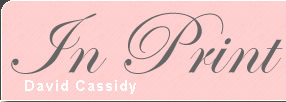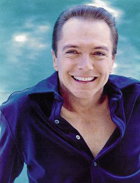
David Cassidy in the News
I had the lot but was so lonely; Cassidy on life as teen idol.
November 04, 2001
By Billy Sloan
Sunday Mail (Scotland)
POP heart-throb David Cassidy has never forgotten the ecstatic welcome he received the first time he set foot on Scots soil.
The date was May 24, 1974, and the singer had arrived at Glasgow Airport for a concert at Shawfield Stadium, home of Clyde FC.
"I always remember being driven to Shawfield and there were fans lined up all along the pavement," said David. "They just wanted to see me go by. I thought it was the most incredible expression of love.
"I love it on this side of the Atlantic. If for any reason I couldn't live in America I'd be happy to settle in Scotland."
David will be back in Glasgow next Sunday for a concert at the Clyde Auditorium. It's part of his first UK tour in 15 years to launch his latest album, Then And Now.
And he's sure to receive another warm welcome from his Scots fans who have remained loyal over the years.
But, at 51, the still handsome David wouldn't want to live through the madness of being the focus of uncontrollable hysteria. For it almost cost him his sanity.
In 1972, David achieved a lifelong ambition when he sold out a massive concert at Madison Square Garden in his native New York.
The hysteria generated by 22,000 teen fans freaked him out. Streets around the Garden were closed. Police reinforcements were called as fans overturned five limousines.
"That show should have been one of the most memorable moments of my career," recalled David.
"I gave one of my best performances. The tough New York critics raved about the show and the buzz in Manhattan was unbelievable.
"But the scenes of complete chaos and pandemonium overshadowed everything."
David felt the weight of the enormous pressures of life in pop's fast lane. He told me: "It turned out to be the loneliest night of my entire life. I was covered in a blanket, bundled into the boot of a car and driven away.
"Less than 20 minutes after I'd run off stage, I was alone in a dump of a motel across the river in Queens ... with the screams of 22,000 girls ringing in my ears.
"I was lying in a bathtub. I had no money so I couldn't even buy myself a soda or a sandwich. I had no ID. I had no way of knowing when my security men were coming back to get me.
"I felt like a condemned man and realised the price I had to pay for being David Cassidy. I thought I just don't have the stomach for this any more."
Then in 1974, tragedy struck when David arrived in the UK for a "farewell tour", which included that memorable gig at Shawfield.
The scenes of hysteria were reminiscent of the height of Beatlemania.
When David played his final UK show at White City Stadium in London 650 teenybop fans were injured in the crush.
A 14-year-old girl, Bernadette Whelan, was carried unconscious from the venue by ambulancemen after her heart stopped. She died on May 30 in the capital's Hammersmith Hospital. David was devastated.
Today - 27 years after the tragedy - he still finds it difficult to talk about that awful night.
He told me: "The media really had a go and tried to blame me for Bernadette's death. They said she had been injured in the crush. But it emerged she'd had a serious heart condition. The excitement of the concert brought on a heart attack.
"I spoke to her parents and they knew she was very ill. They told me they almost felt it would have been her wish to pass away at a David Cassidy gig. It had been her last wish to see me, so they took comfort from the fact that Bernadette died a happy girl."
It took David two more years before he managed to fully break free from the constraints of being a teen idol.
"My farewell tour had given fans a last opportunity to come and see me," said David. "I think a lot of critics thought I was trying to do a David Bowie - announce my retirement then return with an even bigger show.
"But the truth was, my shows just couldn't have got any bigger. How can you surpass hysteria and success on that scale? I needed to stop. Enough was enough."
It took a long time before he was able to lead a normal day-to-day life. He recalled: "It was months before I could even feel comfortable about going out in public alone.
"The first thing I had to do was to try to re-establish my friendships again.
"I'd had no social life between the ages of 19 and 24. I'd done nothing but work when most other guys had gone to college or got drunk with their friends.
"I don't blame anybody for it. I'd wanted to be a success, but I got on this runaway train and just kept hanging on. I should never have let it go so far."
David became close friends with John Lennon, who was living in New York. The ex-Beatle gave him some advice about how to cope with the pressure.
Like Lennon, the singer suffered what he now refers to as "three dark years" addicted to booze and drugs.
"John was one of the few people who actually understood what I'd been going through," revealed David.
"He had wanted to experience what it was like to be a normal person again - doing things such as walking down the street or going to a movie."
David first shot to fame in 1970 when ABC Television cast him in The Partridge Family. His performance as Keith Partridge - opposite real-life stepmum Shirley Jones - launched one of the most spectacular careers in showbiz history.
In the early 70s, The Partridge Family stormed the charts with classic singles such as I Think I Love You and It's One Of Those Nights.
David embarked on a parallel solo career which included the hits, Could It Be Forever, How Can I Be Sure and Daydreamer.
But his pin-up image sparked controversy with the show's producers, especially after he posed naked on the cover of Rolling Stone magazine, a famous shot captured by renowned rock photographer Annie Leibovitz.
TV bosses felt the pose was too risque for the show's wholesome image - but David won the right to continue as a sex symbol after threatening to quit the show.
At 21, he was the world's highest paid entertainer. His official fan club became the largest in pop history - exceeding those of Elvis Presley and The Beatles. With record sales of more than 25 million, it was hard for David to turn his back on the music industry.
He conquered Broadway, playing the lead in the musical, Joseph And The Amazing Technicolor Dreamcoat.
In 1985, he made a brief return to the pop charts with The Last Kiss - which featured mate George Michael on backing vocals.
Two years later, he took over from Cliff Richard in the musical Time in London's West End. He also broke box-office records starring opposite his brother Shaun and Petula Clark in Blood Brothers in the US.
In 1996, David opened at the lavish MGM Grand Hotel in Las Vegas in the spectacular stage show, EFX.
He's been in Vegas ever since and starred with Sheena Easton in The Rat Pack. It's said the pair fell out last year - and she abruptly left the show.
"We got along great... professionally," said David, diplomatically. "She's an extremely talented girl - but at times she was difficult. We didn't become close friends or anything."
Not surprisingly, for a performer who was idolised by millions of devoted female fans, he's had a rather tangled love life.
In the mid-Seventies, he married Rich Man Poor Man actress Kay Lenz. The marriage didn't work out and in 1984, he wed Meryl Tanz, but that relationship also ended on the rocks. The singer now lives in Las Vegas with his third wife, songwriter Sue Shifrin-Cassidy. They have a son Beau, 10. David also has a daughter Katie, now 14, from a previous relationship.
"I got it right third time around," admitted David. "It took me this long to work out what I really needed - a committed loving relationship with a very special woman."
But will he ever be able to shake off his pin-up image? "I never tried to live up to the David Cassidy image... whatever that was," he said. "As a performer, I only ever tried to be the best I could - a positive role model to musicians and fans. That meant a lot to me."
On his latest album Then And Now, David has re-recorded some of his biggest hits - and added some brand new material.
He said: "It was an opportunity to give the fans who've supported me the chance to hear my music, past and present.
"When I did those songs first time around, I was a kid ... but I'm an adult now. My voice, my technique, my whole approach is very different. The new material on the album reflects who David Cassidy is today. The singer also revealed that he once passed up the chance to record a real pop classic.
"In 1973, I was offered Tie A Yellow Ribbon which was a No.1 hit for Dawn. But when I heard the demo I thought it was one of those naff, lounge songs. It's not that it isn't a good piece of songwriting, it is. As soon as I heard it I thought, 'This could be a million seller.' But it was not for me. It was not the direction I wanted to go in. Good luck to Dawn, but I've never regretted it."
Who needs a yellow ribbon when you are a blue riband performer?
DAVID'S RISE TO FAME
Partridge Family (1970): David shot to fame as eldest son Keith in the hit US sit-com
Rolling Stone (1972):
TV bosses were outraged after he posed naked for Rolling Stone
Teenybop pin-up (1974):
Thousands of screaming girls flocked to his sell-out shows
Back on stage (1985):
After a brief spell in musicals, David got back to what he does best
EFX (1997):
David's stage show, using state-of-the-art special effects, is toast of Vegas.
